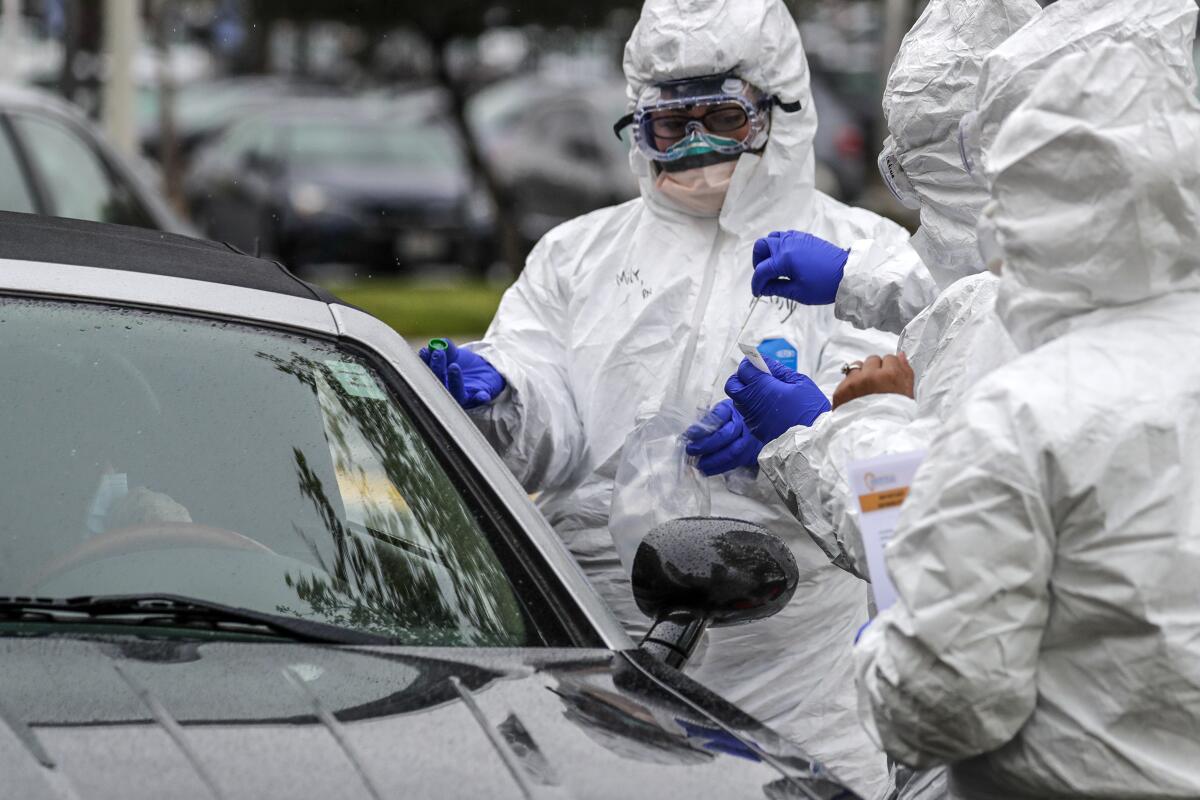U.S. surpasses 10 million coronavirus cases

The United States confirmed its 10 millionth coronavirus infection Monday, a worrisome milestone in a rapidly expanding contagion that is expected to pummel the country through the winter.
One million new infections were recorded in the last 10 days, a drastic uptick as the country faces its third major surge.
Dr. Georges Benjamin, executive director of the American Public Health Assn., called 10 million “a magic number — and a prelude to the hundreds of thousands more deaths we’re projecting.”
“Ten million cases in a 300-million population tells you we have a long way to go, and a lot more people at risk,” he said.
U.S. infections early in the pandemic were concentrated in Seattle, New York and other urban coastal regions, but recent transmission is geographically widespread. Record numbers of cases have been recorded in 28 states, with the highest infection rates in suburban and rural regions of Wisconsin and the Dakotas.
“The virus has not yet hit those communities with full force,” Benjamin said.
The number of people hospitalized nationwide for COVID-19 has almost doubled in the last two months. Daily deaths are also increasing — though not as quickly as new cases, most likely because treatment has improved and more of the victims are younger and therefore have better odds of surviving.
By Monday morning, total deaths had surpassed 237,000. The U.S. Centers for Disease Control and Prevention said it expected that figure to grow by approximately 20,000 over the next two weeks.
“We’re seeing the equivalent of two 747s crashing per day, killing everybody onboard,” said Dr. Carlos del Rio, a global health epidemiologist at Emory University, expressing concern that the public had not grasped the scale of devastation.
“You’d imagine, at some point, someone would say, ‘What’s going on with planes?’” he said. “There would be outrage. And I’m not seeing the outrage.”
Federal researchers recently said they suspected that the pandemic has killed tens of thousands more Americans indirectly — people who avoided hospital care for other illnesses or overdosed on drugs because of psychological stress, for example — bringing the true U.S. death toll closer to 300,000.
Making matters worse, the arrival of winter is expected to drive more people indoors, where poor airflow makes transmission more likely.
The holidays could be troublesome if people break their social distancing habits to gather in large, unmasked groups to share meals.
Public health officials fear that hospitals already facing their annual influx of influenza patients will be inundated with COVID-19 cases and pushed to the brink.
In recent weeks, the virus has also been surging in Italy and France, which have responded with strict measures to contain it.
The United States remains a patchwork of restrictions. The country accounts for only about 4% of the global population, but about one-fifth of all reported coronavirus cases.
While the world has seen a 29% increase in new cases over the last two weeks, the United States recorded a 59% increase.
Benjamin said too many people believe that the dangers of the pandemic have been overblown.
Ten million infections is “a devastating representation of the failure of the nation to embrace the prevention tools we know work: wash your hands, wear a mask, keep your distance,” he said.
More to Read
Sign up for Essential California
The most important California stories and recommendations in your inbox every morning.
You may occasionally receive promotional content from the Los Angeles Times.











